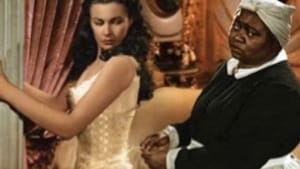Stay in the Loop
BSR publishes on a weekly schedule, with an email newsletter every Wednesday and Thursday morning. There’s no paywall, and subscribing is always free.
You've come a long way, Mammy
Black domestics on stage

Opal Alladin, recently seen in the Wilma theater production of In the Next Room, or the Vibrator Play, and currently performing in Wilma's My Wonderful Day, is a consummate actor whose credits are wide and varied, both off and on Broadway and on TV.
Yet Alladin, as a black actress, has explicitly chosen in these two productions to proudly portray domestic servants.
At one time black women didn't enjoy such an option.
Hattie McDaniel had to work as a washroom room attendant because the salary she received in her early movies playing maids wasn't enough to sustain her. Not that she had a choice of performing any other role, either on Broadway or in Hollywood. Worse, the roles created for maids at that time were one-dimensional and demeaning.
Then along came a radio program called "The Optimistic Do-Nut Hour," where McDaniel created for herself a new characte: Hi-Hat Hattie, a bossy maid who often forgot her place. Even here, though, her pay was still so low McDaniel had to keep her day job as a domestic.
Then she teamed up with Jean Harlow and continued to develop the role of a maid with an "attitude." Who can forget McDaniel as the sassy traveling companion/maid Isabel McCarthy to Harlow's Dolly Portland in China Seas? To be sure, McDaniel received no credit at the movie's end.
An Oscar for Mammy
Yet it wasn't these sharp-tongued portraits that won McDaniel an Academy Award but her portrayal of the eternally wise, demanding and subservient domestic "Mammy" in Gone with the Wind (1939). You can't blame McDaniel for consenting to do this part (it gave her a shot at a lucrative M-G-M contract) and you can see traces of the old spark of her former roles that somehow survived the cutting room. But although she became the first African American to receive an Oscar, that Mammy role catapulted McDaniel to oblivion as a female Stepin Fetchit.
This is a shame, because McDaniel's life and talents (she was also an accomplished singer and musician) should have commanded more respect; it was her misfortune to be born in the wrong time. She had to make her pact with the devil to survive. McDaniel was fond of telling her critics in the black establishment, "I rather be paid $700 a week to play a maid than get seven dollars a week to be one."
Elizabeth's inward strength
Today, most parts are open to all actors. Even when scripts specifically call for an African, they're likely to be in-depth character studies rather than cardboard stereotypes.
In her role as Elizabeth, in In the Next Room, Opal Alladin exuded grace, compassion, sorrow and sexual commiseration as a housekeeper coerced into becoming a wet nurse to her pampered and neurotic employer. An inward spiritual strength encompasses her character.
As Laverne in My Wonderful Day, Aladdin's comic talent is at the forefront as she winsomely projects a woman with ancestry from "beautiful Martinique." With her young daughter in tow, she blissfully whips through her Tuesday day job, carrying her pregnant body across the stage in total obliviousness to the well-heeled blowhards who own "the most grand of townhouses" she must tidy up.
There's no kowtowing here. No, Laverne is a woman with a task to perform and a child to rear. She hasn't made a full-time pact with devils; she merely works for them one day out of seven. Call it progress.♦
For a review of My Wonderful Day by Dan Rottenberg, click here.♦
To read a response, click here.
Yet Alladin, as a black actress, has explicitly chosen in these two productions to proudly portray domestic servants.
At one time black women didn't enjoy such an option.
Hattie McDaniel had to work as a washroom room attendant because the salary she received in her early movies playing maids wasn't enough to sustain her. Not that she had a choice of performing any other role, either on Broadway or in Hollywood. Worse, the roles created for maids at that time were one-dimensional and demeaning.
Then along came a radio program called "The Optimistic Do-Nut Hour," where McDaniel created for herself a new characte: Hi-Hat Hattie, a bossy maid who often forgot her place. Even here, though, her pay was still so low McDaniel had to keep her day job as a domestic.
Then she teamed up with Jean Harlow and continued to develop the role of a maid with an "attitude." Who can forget McDaniel as the sassy traveling companion/maid Isabel McCarthy to Harlow's Dolly Portland in China Seas? To be sure, McDaniel received no credit at the movie's end.
An Oscar for Mammy
Yet it wasn't these sharp-tongued portraits that won McDaniel an Academy Award but her portrayal of the eternally wise, demanding and subservient domestic "Mammy" in Gone with the Wind (1939). You can't blame McDaniel for consenting to do this part (it gave her a shot at a lucrative M-G-M contract) and you can see traces of the old spark of her former roles that somehow survived the cutting room. But although she became the first African American to receive an Oscar, that Mammy role catapulted McDaniel to oblivion as a female Stepin Fetchit.
This is a shame, because McDaniel's life and talents (she was also an accomplished singer and musician) should have commanded more respect; it was her misfortune to be born in the wrong time. She had to make her pact with the devil to survive. McDaniel was fond of telling her critics in the black establishment, "I rather be paid $700 a week to play a maid than get seven dollars a week to be one."
Elizabeth's inward strength
Today, most parts are open to all actors. Even when scripts specifically call for an African, they're likely to be in-depth character studies rather than cardboard stereotypes.
In her role as Elizabeth, in In the Next Room, Opal Alladin exuded grace, compassion, sorrow and sexual commiseration as a housekeeper coerced into becoming a wet nurse to her pampered and neurotic employer. An inward spiritual strength encompasses her character.
As Laverne in My Wonderful Day, Aladdin's comic talent is at the forefront as she winsomely projects a woman with ancestry from "beautiful Martinique." With her young daughter in tow, she blissfully whips through her Tuesday day job, carrying her pregnant body across the stage in total obliviousness to the well-heeled blowhards who own "the most grand of townhouses" she must tidy up.
There's no kowtowing here. No, Laverne is a woman with a task to perform and a child to rear. She hasn't made a full-time pact with devils; she merely works for them one day out of seven. Call it progress.♦
For a review of My Wonderful Day by Dan Rottenberg, click here.♦
To read a response, click here.
What, When, Where
My Wonderful Day. By Alan Ayckbourn; Richard Hamburger directed. Through June 19, 2011 at Wilma Theater, 265 S. Broad St. (at Spruce). (215) 546-7824 or www.wilmatheater.org.
Sign up for our newsletter
All of the week's new articles, all in one place. Sign up for the free weekly BSR newsletters, and don't miss a conversation.

 Jackie Schifalacqua
Jackie Schifalacqua